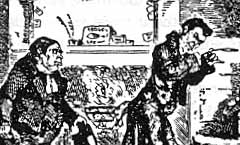Nicholas Nickleby (1839)
 |
The Yorkshire School-master at The Saracen's Head |
|
The Crown According to H. E. Popham in The Guide to London Taverns: 'Dickens definitely places "The Crown," the haunt of Newman Noggs, where he told Nicholas that he could always be found or heard of, at the corner of Silver Street and James Street, Golden Square. The existing "Crown" in Brewer Street claims to be the "Dickens'house." Knowing the great novelist's fondness for transferring names, what conclusion can we come to? Shall we say that if Mr. Noggs were alive to-day he certainly would, in his wisdom, use regularly "The Crown" in Brewer Street, and leave it at that?' (Popham, p.10). Defunct. The George Grantham. Famous coaching inn. Extant. The George and New Inn Greta Bridge. A combination of two different inns at Greta Bridge, The George and the New Inn. Huggins' Brewery Tap Not named. H. E. Popham, in his Guide to London Taverns, moves from 'The Intrepid Fox' in Wardour Street (Soho) to this pub and says: 'We are now well in Nickleby land, the land of the sordid Ralph, our old friend Newman Noggs, the sneaking Arthur Gride and Mrs. Slikerskew. And here "in a bygone, faded, tumble-down street lived the Kenwigses, in a house which was perhaps a thought dirtier than any of its neighbours, which exhibited more bell-handles, children, and porter pots, and caught, in all its freshness, the first gust of the thick black smoke that poured forth, night and day, from a large brewery hard by." / There is no doubt that "the master" was referring to the famous brewery of Messrs. Huggins, and it is more than likely that he sampled the excellent beer in the adjacent brewery tap.' See also the entry for The Crown, the next pub on Popham's West End tour. (Popham, p.10). Inn on the Portsmouth Road (Unnamed) Possibly The Bottom Inn, near Petersfield (identified by G. Harper). Defunct. The King's Head Barnard Castle. Despite legends to the contrary, Dickens didn't write the book there, or lodge there for up to six weeks. He stayed two nights. Extant. ‘P.S. If you should go near Barnard Castle, there is good ale at the King's Head. Say you know me, and I am sure they will not charge you for it. You may say Mr Noggs there, for I was a gentleman then. I was indeed.' The London Tavern There is an article on this place in Household Words, 1852. Opened 1762. Defunct. The Peacock Islington (also mentioned in the Christmas story 'The Holly Tree' and in Tom Brown's Schooldays. Saracen's Head Snow Hill, London. An inn of great antiquity (C12) and fame, no longer extant. It is mentioned by John Lydgate, and in Fennor's The Comptor's Commonwealth. Pepys mentions it 11 November 1661. It was destroyed in the Fire, 1666, and rebuilt. It was demolished in 1868. John Bunyan, after his release from Bedfor Gaol, made frequent visits, and 'Dean Swith made the inn his headquarters in 1710, on his visits to London from Ireland.' (Matz, pp.32-47).
The Unicorn Bowes. Extant. The White Horse (Unnamed) Eton Socon in the novel is Eaton Slocombe. Extant.
|